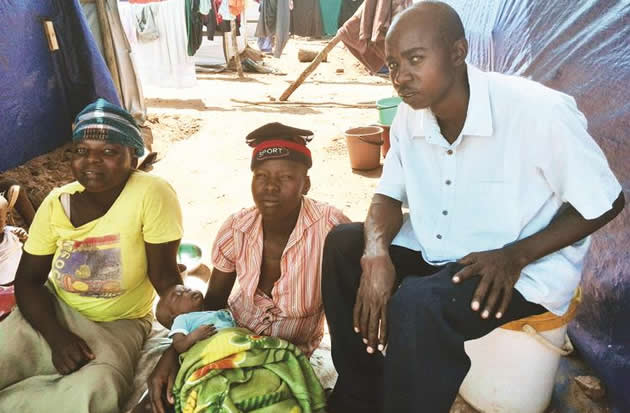Chingwizi: No country for polygamous men

 Roselyne Sachiti Features Editor
Roselyne Sachiti Features Editor
Others spend time in food queues, clothing, water and supplementary feeding for children. Long meetings with village heads under trees and distribution of more essentials, and meetings with health officials are the order of the day.
While all flood victims at Chingwizi have experienced similar hardships, those in polygamous unions have to bear more problems and also the challenge that comes with their kind of marriage.
They say if hell really exists, it could well be at Chingwizi and they are “paying” for their “sin” of marrying many wives.
First, no one really seems to understand their predicament, instead, they are treated like everyone one else, not that they want special treatment.
Then, each family was given only one tent upon arrival at Chingwizi and no exceptions were made for those with more than one wife.
Men like Edmore Masimba (31) a follower of the Johane Marange Church who came from Village 11 Gunikuni area feels the heat, both from the sweltering sun and from the “hot” situation he is in.
 He has three wives — Emily Ziwuku, Elizabeth Ziwuku and Elizabeth Manjenje.
He has three wives — Emily Ziwuku, Elizabeth Ziwuku and Elizabeth Manjenje.
He has sired five children with the two Elizabeths.
Back home, they lived a good life, one Masimba says they were comfortable with — for their standards.
Each wife had her own kitchen and bedroom, pots, plates and pans.
He made a living from market gardening, a business that had given him enough profits to buy a water pump.
Having the water pump meant increased yields which led to more business, more money and in his case more wives.
He had six cows, 15 goats and 15 turkeys.
He was happy.
His six cattle had arrived safely at Chingwizi the previous day and seemed to be in good health.
Sadly, four of his turkeys that had arrived earlier had succumbed to diseases at the camp.
His problems do not end there. He has a headache, one that will not go.
When his family travelled the 210 km journey to Chingwizi aboard a City of Harare truck, they did not know what to expect.
They were shocked when they were told that one tent would house them.
This meant his three wives, five children and he had to put all their belongings in that small tent.
His wives looked up to him — they knew him as a man who would find a solution to any problem.
This time they were wrong, Chingwizi was a bigger problem for their man.
They too had to help him think of what to do to ease the dire situation.
They had to put their polygamy rivalry aside, learn to live in harmony and above all tolerate each other’s weaknesses.
It has not been easy, but they are trying.
“It is hard staying with three wives in one tent. One wife may be careless, another very particular about leaving things lying around. As a man you have to work hard to make sure all goes smoothly,” says Mazimba.
He has partitioned the tent into two compartments using blankets in an attempt to create some sort of privacy.
The space is too small — and the blanket regularly falls — there is no privacy to talk about.
Meal times for his big family are equally stressing.
Back home, each wife would pamper him with good food everyday.
“One wife would maybe cook chicken, another leafy vegetables in peanut butter and then the other beef,” he recalls.
“They would all bring the food and I would eat. Here, things are different. We now cook in one pot. The food is mostly beans and kapenta. I have lost weight,” he complains.
He says even his skin colour has changed, he has become darker. His treasured water pump is now stored under a piece of furniture in the house.
Looking at it brings mixed emotions. He doesn’t know what to do with it yet- either to sell or keep it. The time they spend there will help him decide.
They get the same food ration as everyone else.
“They say the name of the person assessed is the ticket to food and clothing.
“In our case, my name was written down meaning I represent my family but only get food rations for a single family. My other two wives are literary not considered,” he says.
At least, he adds, they have been receiving 50kgs of maize meal a month.
Rumour has it their allocation will be increased to 100kgs, he still has to confirm for in Chingwizi one has to keep their ears on the ground or miss out.
Their challenge, he points out, is that of relish. The 1kg packet of beans and kapenta rations are too little, especially for his family.
They are never sure of when food comes, they just hear through announcements when the time comes, he adds.
There is no more intimacy with all three wives.
“We were told to wean off sex when we came here. We just sleep and do not talk about it. Kuita stuff hapachina,” he complained.
He is at home with third wife Emily.
The other two have gone to do laundry using water in canals in the sugarcane plantations.
Emily, too, has complaints of her own.
The tent is too small, especially for one man and three wives and five children.
The floods swept away their intimacy, they miss their husband.
Chingwizi has made it worse, staying in one tent is hard.
She says having been used to cooking in her own kitchen, she now tries to keep peace with the other two wives, one of whom is her sister.
On this day, Emily had remained behind to wait for Unicef trucks that were supplying drinking water from Triangle.
The water in boreholes whose drilling was also funded by Unicef is too salty, she and many other flood victims say.
They prefer the water that is ferried in the bowers and queue long hours.
They are not alone.
Many other polygamous families are dotted in the settlement, their challenges alike.
Ishmael Marodza (30) who also has three wives and five infant children, came from the Nyajena area.
He also received one tent when they arrived at Chingwizi.
He shares it with his wives Vongai Musiki (29), Unity Maipe (22), and Agnes Chishava (20).
When the floods came, he had no choice but leave his job in Beitbridge where he worked as a driver.
“I heard the situation was bad and had to come here. If anything, carrying heavy property is the job of men, my wives could not have managed,” he added.
He wants two more tents for his other wives.
“We have gone to the offices to tell them of our tent plight but they keep telling us that we already received ours,” he bemoaned.
He adds: “I encourage my wives to put things in place, if the women police each other, then fights will break. I will rest when each one gets a tent.”
He also wants government to relocate them early.
However, his peers with many wives envy him.
He, at least, is getting his conjugal rights.
Each night, he chooses the wife he wants to be with.
Those not chosen and the children form a beeline and go to his mother’s tent, where they spend the night.
His mother was also affected by the floods and stays alone at the settlement.
His tent also has two compartments.
“It is hard to be polygamous in Chingwizi,” he says, “but as a man you find ways to manage the situation.”
He also compares life back home and at Chingwizi.
Back in the village, they had 10 goats. Two died at Chingwizi.
All his 10 chickens also died of Newcastle at Chingwizi.
His wife, Agnes said she wants her own tent where she can stay with her new born baby.
The baby was one of the nine born at a temporary clinic at Chingwizi.
Having her own tent also means the return of conjugal rights, a development she has been longing for but not getting.
Mazvozva’s second wife Unity said she, too, wants her own tent.
Life is hard living with her rivals under the same tent and having to cook in the same pot, she says.
Her baby is one year old and has three nappies; the others were lost in the floods. Pampers they used to get are no longer coming. She uses an old t-shirt instead.
Minister of State for Masvingo Province Kudakwashe Bhasikiti says every family is now being given food to last for 30 days.
“There are also big families. You know our traditional way of life. Some have four to five wives and we give 100kgs of maize meal. We have been assessing them to see their needs,” he said.
As the heat continues, the people of Chingwizi move in different directions, hoping for a new day to bring a better life.
- Feedback: [email protected]. Follow me on rosesachiti.blogspot.com









Comments